When it comes to ways to motivate your team, the carrot and the stick must go. “Businesses are based on relationships and relationships are based on people,” is one of Marcus‘ go-to sayings. And you can’t build healthy relationships with a team that you’re either manipulating by dangling a reward (the carrot) or traumatizing by dishing out punishment (the stick).
First, let’s start with the negative sales training techniques. You might have been using fear or punishment (the stick) to motivate your team without even noticing. Examples of this can be seen in companies where a manager makes it a habit of reprimanding workers in public to make an example out of them. Or where the sales team is pushed to meet an unrealistic daily or monthly quota—or face the consequences which could include termination of employment. This type of behavior can quickly tarnish the team’s morale and lead to a toxic work environment, the total opposite of what you had hoped to accomplish. Wharton management professor Andrew Carton said, “Fear is a normal human emotion, and—when held in check—can sometimes be a practical or even necessary way to ensure that people do not become complacent. But when fear becomes an entrenched marker of an organization’s culture, it can have toxic effects over the long run. In addition to stifling creativity, it can inhibit collaboration and lead to burnout” (2018). Research has demonstrated that as tools for motivating workers, fear and intimidation create many risks and thus have been widely discredited by modern psychology. So, you should try to avoid the stick.
That leaves us with the carrot, which, on its face, may seem like a good approach. After all, positive reinforcement is among the best approaches to motivate a team. But there is a fine line between offering a reward as a goal and using rewards to manipulate your team to do things your way. So, let’s simply focus on the best ways to motivate your team to drive sales and create the healthiest work environment conducive to building the best possible relationships with your team.

Have a Clear Mission Statement
One of the most excellent sales training techniques you can use to motivate your team is to keep them engaged with the business’s mission. It is crucial for everyone in the organization to understand what the company is setting out to do. Making sure everyone knows the why of things provides a purpose and lets them know how their actions—and inactions—affect results. By showing the team that what they do is essential and that their work matters, they will feel a sense of duty and responsibility. Now, it’s not just a job; now they are part of something big, something important.
- Monetary rewards can cause greed. Pitting team members against each other to fight for rewards can lead to a cutthroat environment that could be toxic for many. While bonuses are great incentives, be careful not to create a company culture driven strictly by monetary rewards. Instead, help team members focus on the long-term relationships and the company's overall mission.
- Recognition and motivation is key. To some, the sense of accomplishment, of doing something worthwhile, or creating change in someone's life, might mean more than a cash bonus. As a leader, it is important to know what drives each of your team members in order to engage them in the most appropriate way. "People will work for recognition and opportunity more than they'll work for anything else," says Marcus.

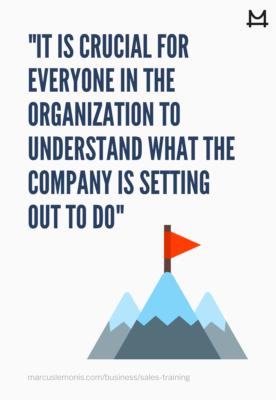
Do Your Rounds
A good leader will check up on the team members every so often. One-on-one meetings are a great way to see how your team is doing – 15 to 30 minutes a week, or every other week, is more than enough to gauge team morale, address individual situations, and show that you care about how they are doing. Listen to your team and help them achieve their personal goals by setting them up for success. Address challenges and build the necessary rapport that will lead to trust. By creating trust, you will be developing loyalty and a sense of belonging that will translate to dedication and engagement and drive results. Without rapport and empathy for who your team members are, you will be a lot less likely to create a working environment conducive to positive outcomes. When it comes to your team, they should always be your priority. Marcus has been hugely successful in building highly motivated teams because he always says that “the customer is not number one to me. They’re number two, right behind the employee.”

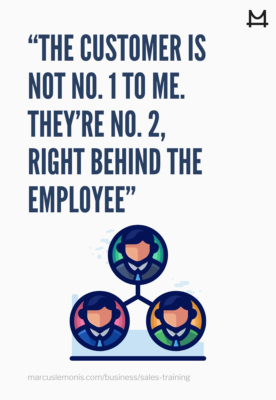

Have Well-Defined Business Goals
Uncertainty is one of the biggest enemies of motivation. If your team doesn’t know what is expected of them, it will be challenging for them to deliver. Be clear in what you expect from your team, and make sure that they understand these expectations. Keep your team updated with the latest information as it may pertain to them. Provide clear direction so they know which way to go and they can all row in the same direction.
Reward When Deserved
Recognizing the team members that are meeting or exceeding expectations is crucial in order to keep them engaged. If they execute flawlessly and their effort is not appreciated, they could think that their effort was in vain, that maybe it didn’t matter, or that you simply didn’t care. Acknowledge when people are doing the job well so they know you’re paying attention. As mentioned before, it doesn’t have to be a monetary reward. Sometimes a simple “job well done” can go a long way. A round of applause at a team meeting or even a greeting card can carry more motivational weight than a cash bonus.

This can also be an excellent opportunity to motivate other team members or even create some friendly competition. Humor can also go a long way. David Novak, co-founder & retired CEO of Yum! Brands had his office filled with random knick knacks like a rubber chicken, a set of teeth on skinny legs with oversized feet, a plastic hog, and a red clay roof tile—all essential elements in a leadership system that produced the company’s knockout performance. See, Novak has developed a discipline for nurturing and developing leaders that centers on recognition for over 30 years. Those knickknacks are among the scores of bizarre prizes that Yum! Brands gives out to outstanding employees (Colvin, 2013).
Additional Rewards
Remember back in school when the classroom who raised the most funds would get a pizza party? Everyone would go crazy trying to win that pizza party, and it had nothing to do with the pizza. It was all about bragging rights and time off from class for the party. Those drivers still exist in us as adults. Sometimes the bragging rights are worth way more than whatever reward you had in mind. That special parking spot for the “Salesperson of the Month” is a great motivator (and also very cost-effective.) Even bringing back the pizza party for the team with the most sales can be a fun way to create friendly competition and have a team bonding event. Want to bump it up a notch? Feel free to reward them with “time off from class” too. How about some paid time off for the team members who work the hardest? They can probably use a day to relax more than the rest; plus, they deserve it.
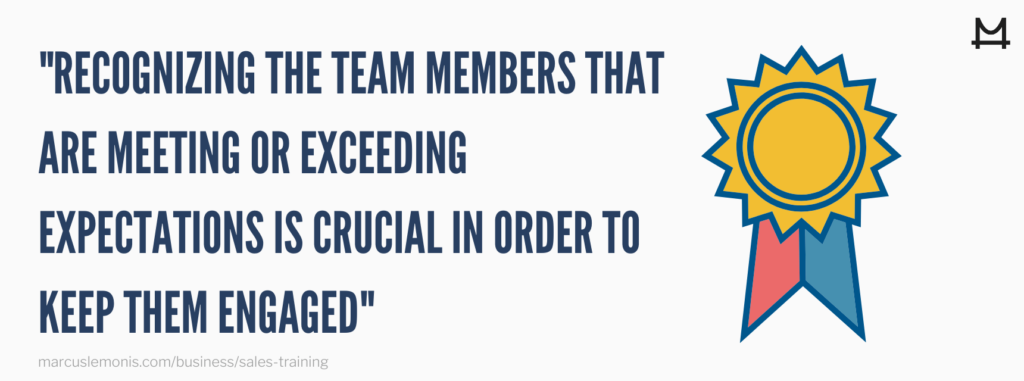
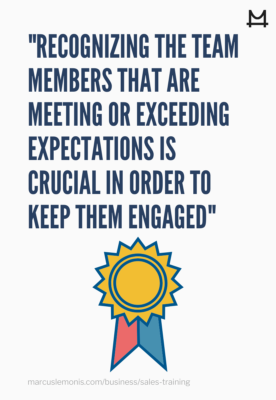
Get to Know Your Team Members
Remember when we talked about one-on-one meetings? They are so vital that we are going to go over it again. These brief touchpoints are crucial to get to know your team. Everyone is different. Listen to your team and pay attention to what makes each one tick. Only that way will you be able to get the most out of each one of them. While some may love the spotlight and public recognition, others may hate it. Nothing can be less counterproductive than trying to motivate an introvert by threatening to put them on center stage. Make sure that you motivate accordingly by assigning tasks fitting the personalities of your team members and rewarding them in ways that each individual would appreciate.
Create a Stable and Positive Work Environment
Ultimately, nothing is more conducive to productivity than happiness. A happy sales team is going to be a highly motivated sales team. When people enjoy what they are doing, they will do it better than anyone else. People are more likely to work effectively and motivated if their environment is comfortable and enjoyable. So, why not set your team up with those things that you know will make them happy?
Free snacks in the break room? Salesforce does it. Pet-friendly offices? Starbucks does it. Freedom to work remotely for personal convenience? UnitedHealth Group does it. What do all these companies have in common? Happy employees that have made them all leaders in their industry. Find what would make your team happy and set them up for success. The return on your investment will be worth it.
Offer Clear Paths for Growth
As mentioned before, uncertainty can be a motivation-killer. This also applies to your team’s career path. Sitting down with your team to delineate a career path so that they can see the company’s potential for growth is a great motivator.

Showing them that the opportunities exist for them to develop their careers within your company will motivate them to work harder to achieve those goals. Still, it is also going to increase a sense of loyalty – thus, lowering your churn. Offering a clear path towards promotions and pay raises can be powerful ways to motivate your team. Another motivator is investing in sales training techniques to develop your team members’ skills and help them grow professionally. Investing in training sessions, seminars, conventions, online courses, and learning materials for your team to improve themselves also demonstrates support and engagement on your behalf.
Be Transparent
Being open with your team will help build trust and credibility. These are the foundations of a long and healthy relationship, which is the best type of connection to have with your team.

Celebrate Wins!
Work hard, play hard, right? Respecting your team members’ vacation time and personal time off is necessary for a healthy and professional relationship. One of the most common mistakes a manager makes without realizing how detrimental the consequences can be to a team member’s motivation is canceling their planned vacation time. And it happens a lot more than anyone likes to admit. Make sure that those who work hard get to enjoy time off to play hard as well. An extra day of vacation time as a reward for a job well done or half-days for Summer Fridays can also go a long way toward team motivation and morale.
But what about the more literal type of celebrations, like a company-sponsored happy hour? Team lunches, end of the year celebrations, and any other kind of event can be good ways to motivate your team. Maybe a monthly event where the best employee or team of the month is celebrated can mark a job well done and serve as an incentive for the rest to do even better the following month. Employees’ birthdays and anniversaries are also a great way to create engagement while highlighting that one exceptional employee of the day.

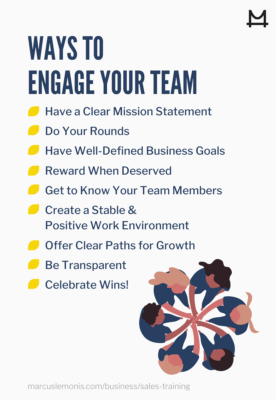
So, are you ready to create a corporate culture that is positive and conducive to high levels of productivity? Do you feel you have a better grasp of sales training techniques that will grow your team’s morale and business? Remember that all you need to do is take care of your employees to take care of your clients. As Marcus says, “If the employee is happy, then the chances of the customer being happy are exponentially better.” So, when your team is happy, motivated and set up for success, chances are they will bring your business success as well.
- When was the last time you got feedback from your employees?
- What new strategies are you going to implement to engage your team?
Colvin, G. (2013, July 25). Great job! How Yum! Brands uses recognition to build teams and get results. Retrieved from https://fortune.com/2013/07/25/great-job-how-yum-brands-uses-recognition-to-build-teams-and-get-results
Podcasts Wharton Business Daily North America. (2018, December 4). Does fear motivate workers – or make things worse? Retrieved from https://knowledge.wharton.upenn.edu/article/fear-motivate-workers-make-things-worse





